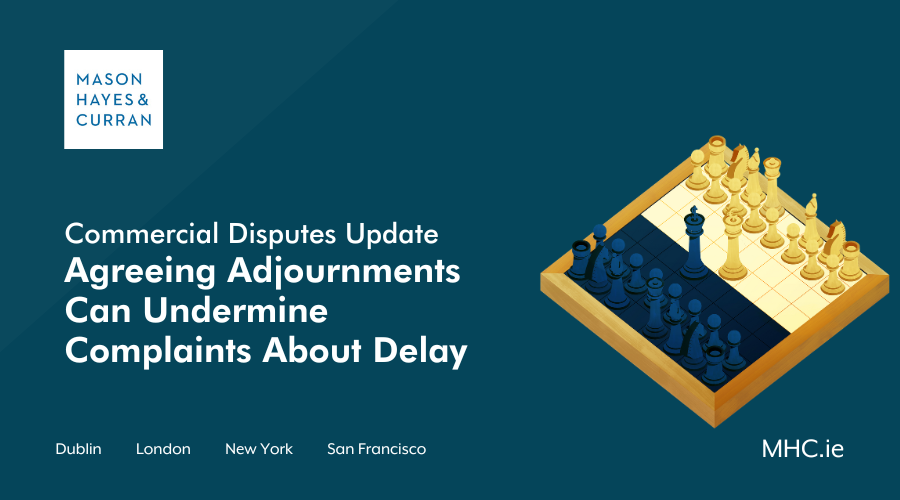Agreeing Adjournments Can Undermine Complaints About Delay

The High Court recently ruled against dismissing a case due to delay, noting the defendants' consent to multiple adjournments as a key factor. This decision highlights the risks of agreeing to multiple adjournments when seeking later dismissal. Read our analysis, by our Commercial Disputes team, on how this ruling may impact commercial litigation strategy.
The High Court has recently considered a case where the defendants failed in seeking to dismiss proceedings on the basis of delay.[1] A key consideration in the decision to deny the relief requested was that the defendants’ had consented to multiple adjournments during the period that constituted the delay. The plaintiff had significantly delayed moving the case forward. However, the Court found that this delay was excused because the defendants had agreed to several adjournments, thereby themselves contributing to the delay.
Background
The underlying proceedings, commenced in early 2014, were brought by way of summary summons against a pair of borrowers. A number of loans provided by NIB/Danske were the subject of the litigation. A default judgment was set aside by mutual agreement in February 2015. The defendants submitted sworn affidavits challenging the claim. Both sides then presented their positions through several more affidavits filed afterwards.
Although the plaintiff’s application for summary judgment was scheduled for hearing, it was adjourned on a number of occasions up to November 2018 due to the filing of additional affidavits. Given the defendants were not legally represented for some of that period, the Court considered that the case was proceeding as one might expect in the circumstances. However, a lengthy delay then took place. In March 2022, an ex parte, that is a one side only, application was made. The application sought to substitute Pepper Finance (Pepper) as plaintiff in place of Danske Bank, to reflect the fact of the sale of the relevant loans to Pepper. Subsequently, in April 2023, Pepper applied to amend the summons to reflect a Supreme Court ruling which had issued in the meantime.[2] However, in the period since 2019, the judgment application had been adjourned by mutual agreement between the parties on 15 separate occasions. In addition, assigned hearing dates were adjourned a number of times, again on consent, between December 2018 and October 2020. Both parties agreed that the adjournments were due to negotiations which were ongoing. However, they disagreed as to the times the negotiations were ongoing. The defendants eventually brought their own application to dismiss the proceedings for inordinate and inexcusable delay. They also relied on Order 122, Rule 11 of the Rules of the Superior Courts, arguing that the case had not been actively pursued such that there had been a “want of prosecution”. The High Court ultimately heard the dismissal application and delivered its ruling in late September 2024.
Analysis
Ms Justice Bolger acknowledged that, in general, the Court would view a mutually agreed adjournment to allow negotiations as a valid reason for delay. This reflects the Court’s desire to support and encourage settlements of disputes. However, given the conflict on the evidence regarding the negotiations, she felt the plaintiff’s explanations did not excuse the entirety of the period of delay. Additionally, since it was found that there had been inordinate delay, the fact that the defendants had agreed to 19 adjournments in total during the time period had to be taken into account in considering whether the delay was excusable. In doing so, she found that the plaintiff’s delay was:
“Excused by reason of the defendants’ participation in consenting to a vast number of adjournments of motions and hearing dates…”
She then looked at the balance of convenience, especially from the defendants’ perspective as they claimed the delay had rendered it impossible for them to get a fair trial. The defendants argued they would suffer prejudice if the action were to proceed in a number of respects:
- They maintained that the lack of documentation available from Danske Bank would preclude them in running a full defence. The Court rejected this, noting that the absence of that documentation was an issue since 2016, and there was no suggestion the delay period to 2023 affected that issue or created any further prejudice.
- The defendants also expressed a concern that any discovery, if permitted, would be insufficient. The Court considered this was speculative – to get discovery, they would first need to be permitted to defend the case as a plenary action[3]. Even then, the Court found that there was “no crystal ball” to determine what discovery might be directed or made available.
- The defendants also relied on possible prejudice arising from the claimed flawed recollections of potential witnesses. For similar reasons as to the speculative nature of the assertions made regarding discovery, the Court disregarded this argument. The claimed prejudice was “vague and generalised” and the defendants’ claims their own recollections were impaired was at odds with the detailed affidavits they themselves had sworn.
Overall, Ms Justice Bolger noted[4] that there must be a causal connection between a delay and the prejudice claimed. However, she observed that much of the contended prejudice here occurred well before the delay period between 2018 and 2023. Moreover, she felt that any issues that may arise from the delay in that time period could be dealt with by the trial judge.[5]
In light of her decision, the judge made a provisional ruling on costs. Ms. Justice Bolger indicated that since the plaintiff had successfully defended the motion, it was entitled to recover its costs.
Conclusion
The decision gives an insight into how multiple consent adjournments in the course of proceedings can serve to compromise a subsequent application to strike out those proceedings for delay. A party who may ultimately seek to bring such a dismissal application should be mindful of the consequences of agreeing multiple adjournments, especially if they cannot point to clear prejudice. Perhaps more realistically, the decision should serve as a warning to those who have consented to multiple adjournments and who, despite that conduct, might be minded to bring a dismissal application. In such circumstances, not only is there a real danger that they may not prevail in the application, but they may also find themselves on the receiving end of an adverse costs order.
For more information and expert advice on commercial disputes, contact a member of our Commercial Disputes team.
The content of this article is provided for information purposes only and does not constitute legal or other advice.
[1] Pepper Finance Corp (Ireland) DAC v Roche & Roche [2024] IEHC 567
[2] Bank of Ireland Mortgage Bank v. O’Malley [2019] IESC 84
[3] Summary proceedings proceed on affidavit without discovery unless the defendants can show they should be given leave to defend the case, whereupon the proceedings are to be fully pleaded before proceeding to a full hearing with oral evidence.
[4] Relying on the Court of Appeal decision in Cave Projects Ltd. v. Kelly [2022] IECA 245
[5] Relying on the Court of Appeal decision in Sullivan v. HSE [2021] IECA 287
Share this:



